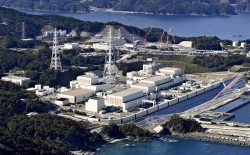
Science Council President Takaaki Kajita
12:17 JST, July 28, 2022
The Science Council of Japan has effectively accepted to allow advanced science and technology research that can have both military and civilian applications, forming a view that it has become difficult to clearly differentiate the two purposes.
The council, which represents scientists in Japan, had consistently opposed scientific research for military purposes. However, it appears to have shifted its stance on the issue due to the importance of boosting research related to national security. Science Council President Takaaki Kajita expressed the council’s opinion on dual-use research in a letter dated July 25 to State Minister for Science and Technology Policy Takayuki Kobayashi.
“Distinguishing science and technology research by its potential for diversion [to the military] or making blanket judgments about its applications is not realistic,” Kajita stated in the letter.
During an online press conference on Wednesday, Kajita said: “We’ve deepened our way of thinking even more so that it will meet the times and the progress of scientific technologies … From now on, we need to move in a direction that will allow us to do our research while sharing the way we think with universities and other similar institutions as well as the government.”
Deputy Chief Cabinet Secretary Seiji Kihara said on the day, “Japan will be able to maintain and improve its academic research and global competitiveness [through the latest move.]”
The council is calling for researchers and research institutions such as universities to properly manage how research is conducted, including careful consideration of the balance between the disclosure of results and security considerations as research progresses.
The council declared in 1950 and 1967 that it “would not conduct scientific research for military purposes,” in reflection of the involvement of scientists in World War II, and it released a statement expressing its concerns over the research systems at the Acquisition, Technology and Logistics Agency in 2017.
However, rapid advances in science and technology have made it increasingly difficult to make distinctions regarding military and civilian applications. For example, while space technology is useful for military purposes, it is also indispensable in the fields of communications and disaster prevention, and the development of vaccines can also be linked to technologies for biological weapons. Such factors have prompted accusations that the council’s cautious stance “has been hindering innovation.”
“Restricting research that could have several possible applications is not positive for the development of science,” said Prof. Koichi Sumikura of the National Graduate Institute for Policy Studies. “I think the council has made a pragmatic decision.”
Top Articles in Politics
-

Japan PM Takaichi’s Cabinet Resigns en Masse
-

Sanae Takaichi Elected 105th Prime Minister of Japan; Keeps All Cabinet Appointees from Previous Term
-

Japan’s Govt to Submit Road Map for Growth Strategy in March, PM Takaichi to Announce in Upcoming Policy Speech
-

LDP Wins Historic Landslide Victory
-

LDP Wins Landslide Victory, Secures Single-party Majority; Ruling Coalition with JIP Poised to Secure Over 300 seats (UPDATE 1)
JN ACCESS RANKING
-

Japan PM Takaichi’s Cabinet Resigns en Masse
-

Japan Institute to Use Domestic Commercial Optical Lattice Clock to Set Japan Standard Time
-

Israeli Ambassador to Japan Speaks about Japan’s Role in the Reconstruction of Gaza
-

Man Infected with Measles Reportedly Dined at Restaurant in Tokyo Station
-

Man Infected with Measles May Have Come in Contact with Many People in Tokyo, Went to Store, Restaurant Around When Symptoms Emerged





















